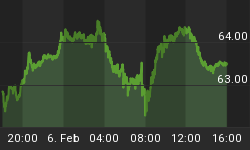Confusion reins supreme ahead of Thursday's EU summit that German Chancellor Angela Merkel thinks is "urgently necessary." However, Merkel will only attend if there is a plan that will be approved.
Is there any conceivable solution that can be worked out in 4 days? I suggest it is impossible.
Please consider Confusion reigns as Europe limps toward Greece summit
Confusion over competing policy proposals reigned among officials and bankers on Monday as Europe struggled to put together a second bailout of Greece and prevent the region's debt crisis from spreading.
For starters you cannot prevent something from spreading that has already infected Greece, Ireland, Portugal, Spain, and Italy.
French government spokeswoman Valerie Pecresse said she believed a summit of the euro zone's 17 national leaders scheduled for Thursday in Brussels would agree on a rescue of Greece, supplementing a 110 billion euro ($154 billion) bailout launched in May last year.
But after three weeks of preparatory talks, it remained unclear whether government officials and commercial bankers could agree on a way for private owners of Greek government bonds -- banks, insurers and other investors -- to contribute to the bailout by taking cuts in the face value of their holdings.
Paul de Grauwe, a professor of international economics at Leuven University in Belgium who has informally advised European Commission President Jose Manuel Barroso, said politicians had delayed taking decisive action on Greece for so long that their options were narrowing fast.
"We've had solutions in the past, but we haven't grasped them. Now it's too late for some of those solutions to work anymore; the opportunity has been lost."
So Many Proposals One Cannot Rule Out Anything
Officials are wrestling with a range of schemes for Europe's bailout fund, the European Financial Stability Facility, to finance a voluntary buy-back or swap of Greek debt that would be conducted at a discount to face value, helping to reduce Greece's 340 billion euro mountain of sovereign debt.
But all of the schemes could face major technical and legal obstacles, in some cases requiring the approval of national parliaments in the euro zone. Other proposals still appear to be on the table; Germany's Die Welt newspaper reported on Monday that governments were considering a levy on banks as a way to involve private creditors in rescuing Greece.
An official of a major euro zone government who is familiar with the talks said he had not heard of a proposal for a bank levy, but added: "There are at the moment so many proposals that you cannot rule out anything."
That there are so many proposals is evidence of massive confusion. It is also evidence none of the proposals can possibly work.
If a deal on private creditor participation is reached, it may cut Greece's debt by just 20 or 30 billion euros, not nearly enough by itself to solve the problem. Analysts have estimated the debt would have to be roughly halved, to 80 percent of gross domestic product, to make it manageable in the long run.
German Chancellor Angela Merkel said on Sunday that while this week's summit was "urgently necessary," she would only attend if lower-ranking officials had already prepared a clear rescue plan. "I will only go there if there is a result."
Some official sources have said interest rates on bailout loans extended to Greece, Ireland and Portugal may be cut and maturities on those loans extended drastically, perhaps to 30 years.
There has also been talk of expanding the 750 billion euro bailout facility which the European Union and the IMF jointly created last year as the debt crisis erupted.
Die Welt quoted unnamed diplomatic sources as saying the IMF was angered by Europe's crisis management and that "influential parties" in the Fund wished not to take part in further bailouts of Greece. It did not elaborate.
Many private economists think some form of regional guarantee for countries' debt along the lines suggested by Summers -- or perhaps even the issuance of joint euro zone bonds -- may ultimately be the only way to emerge from the crisis without one or more weak states being forced out of the zone.
But Germany has shown no appetite for such a sweeping solution, which in any case would require a complex and time-consuming revision of the EU treaty.
"We are against euro bonds," German government spokesman Steffen Seibert said on Friday, repeating Berlin's concern that a common bond for the single currency area would provide no meaningful incentives for national governments to pursue prudent budget policies.
No Acceptable Solution
By now it should be obvious that there is no real solutions, only 30-year can-kicking proposals.
Even default is not a solution because default does not fix the underlying problem of widely varying fiscal policies and structural issues among member countries.
The ECB's "One Size Fits Germany" interest rate policy greatly compounds the problem.
Once again we return to the Right Place to Crash the Plane
The Plane Crash Solution has two Options.
- Breakup of the Eurozone
- Creation of the European Nanny State
Either one is a serious undertaking requiring complex revisions to the EU treaty. Which will it be, and how long will it take?
Sovereign Debt Yields Soar
In the wake of the mass confusion (panic is probably a better word), European sovereign debt yields have soared to new highs.
For a look at 2-Year and 10-Year charts please see Greece 2-Year Debt Hits 35.98%, Ireland Hits 23.31%, Italy 10-Year Debt Tops 6%, New Highs In Spain; Sovereign Debt Charts















